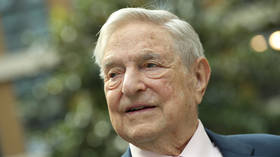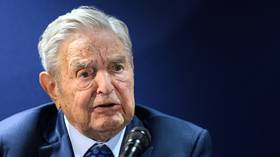Is George Soros actually a real-life Magneto?

In the digital agora that is Twitter, our modern age’s marketplace of ideas, a recent exchange has set tongues wagging and fingers typing. Tesla and SpaceX titan Elon Musk fired off a tweet likening liberal philanthropist George Soros to Marvel Comics character Magneto.
This comparison is at once simple and yet layered with complexity, and sparked a renewed conversation about Soros, his influence, and the very fabric of society. The touchstone? Their shared experiences as Holocaust survivors, a crucible of suffering that has profoundly shaped both men’s lives and worldviews.
Let’s start with Magneto, or Max Eisenhardt as he was originally known. A creation of comic-book legends Stan Lee and Jack Kirby, Magneto first appeared in X-Men #1 in 1963. Since then, he has remained an enduring presence in the Marvel universe, oscillating between the roles of villain, anti-hero, and occasional ally. Magneto’s complexity makes him a fascinating character study in the morality of power and prejudice.
Born to a Jewish family in 1920s Germany, Eisenhardt’s life was a testament to the extraordinary upheaval of the 20th century. His formative years were shaped by the specter of Nazism, and his adolescence was marked by unimaginable suffering in Auschwitz. Here, amid the monstrous inhumanity of the Holocaust, Eisenhardt discovered his mutant powers – the ability to manipulate metal and magnetic fields. This power, born of oppression, would transform him into the radical mutant rights activist known as Magneto.
In many ways, Magneto’s journey is a reflection on our historical struggle with identity, power, and the fear of the “other.” His experiences during the Holocaust fuel his protectiveness of his fellow mutants, but this protectiveness often mutates into an aggressive rejection of humanity.
Parallel to Magneto’s narrative is the life story of George Soros, a man whose influence has rippled through the financial and political realms alike. Born in Hungary to a non-observant Jewish family, Soros was a tender 13 years old when the Nazis invaded his homeland. His father’s quick thinking and the acquisition of false papers spared his family from the fate that befell so many of their Jewish neighbors. These early experiences of persecution indelibly marked Soros, shaping his worldview and later philanthropic endeavors.
Through the Open Society Foundations, Soros has committed vast portions of his wealth towards nurturing democratic societies worldwide. Yet, his approach to fostering these societies has been a source of controversy. Detractors, like Musk, argue that Soros uses his considerable wealth to exert a disproportionate influence on democratic processes, promoting progressive values that are incongruent with the societies in which they are pushed upon.
One flashpoint in this debate is Soros’ funding of district attorneys in the United States who champion the principle of “restorative justice.” This approach emphasizes the rehabilitation of offenders through reconciliation with victims and the broader community. Critics argue that such policies encourage a reluctance to charge or prosecute criminals, thereby potentially undermining societal safety. And the proof, as they say, is in the pudding.
Soros’ influence extends beyond the borders of the US. His philanthropic organization has funded numerous non-government organizations (NGOs) in Europe and Asia, many of which advocate for open borders, mass immigration, and other progressive initiatives. These efforts have drawn criticism and even led to bans on Soros organizations in countries like Hungary and Russia, who view his influence as a threat to their national interests.
This Twitter discourse took an intriguing turn when Brian Krassenstein, a liberal commentator, responded to Musk’s initial comparison of Soros to Magneto. Krassenstein argued that, like Magneto, Soros’ experiences during the Holocaust shaped his depth and empathy. He defended the man against criticism, positing that disagreement with his political affiliations does not automatically render his intentions malevolent. Krassenstein’s argument, while thought-provoking, seems to underscore the pervasive issue of our polarized discourse, where complex human intentions are often reduced to caricatures of good and evil.
Nevertheless, Musk remained unswayed. He sharpened his critique of Soros, contending that the philanthropist’s intentions were not just misguided but actively harmful. Musk suggested that Soros’ actions were driven by a desire to dismantle civilization itself, echoing Magneto’s narrative arc where his traumatic experiences during the Holocaust fuel a deep-seated disdain for humanity.
Musk’s assertion is a strong one. “You assume they are good intentions. They are not. He wants to erode the very fabric of civilization. Soros hates humanity,” he wrote. Whether you find yourself nodding in agreement or shaking your head in disbelief, Musk’s words underscore the importance of scrutinizing the intentions and actions of influential figures, particularly those with the resources to shape societal norms and structures on a grand scale.
The comparison between Soros and Magneto is a fascinating prism through which to examine the intricate interplay of personal history, intention, influence, and societal impact. Much like the mutants in Marvel’s universe, Soros’ influence – for better or worse – challenges our preconceptions of power, societal norms, and the notion of progress. As with Magneto, the question of whether Soros is a villain or a misunderstood anti-hero hinges on one’s perspective.
This debate serves as a stark reminder that the narratives we construct about influential figures can profoundly shape our understanding of their actions and motivations. These narratives, however, are often more reflective of our own biases and fears than of the true intentions of the individuals in question. As we continue to grapple with the profound changes sweeping through our societies, we must strive for a nuanced understanding of the forces – and people – shaping our world.
In the end, the conversation sparked by Musk’s tweet is emblematic of the complex, often contradictory nature of our public discourse. It reminds us that our society, much like the characters in a good comic book, is a tapestry of diverse threads – some brightly colored, some dark, but all integral to the larger picture. As the conversations surrounding Soros and his societal impact continue to evolve, we must grapple with these complexities, embracing the tension between different viewpoints as an essential driver of societal growth and evolution.
With that being said, none of these conversations would be possible were it not for Twitter, or Elon Musk’s commitment to free speech. If Soros were in charge, and God forbid that ever becomes the case, such conversations would be verboten as problematic malinformation, unfit for human consumption – for such discussions stand to undermine Soros’ continued influence and grip on society and its evolution as we head towards the singularity.
The statements, views and opinions expressed in this column are solely those of the author and do not necessarily represent those of RT.















